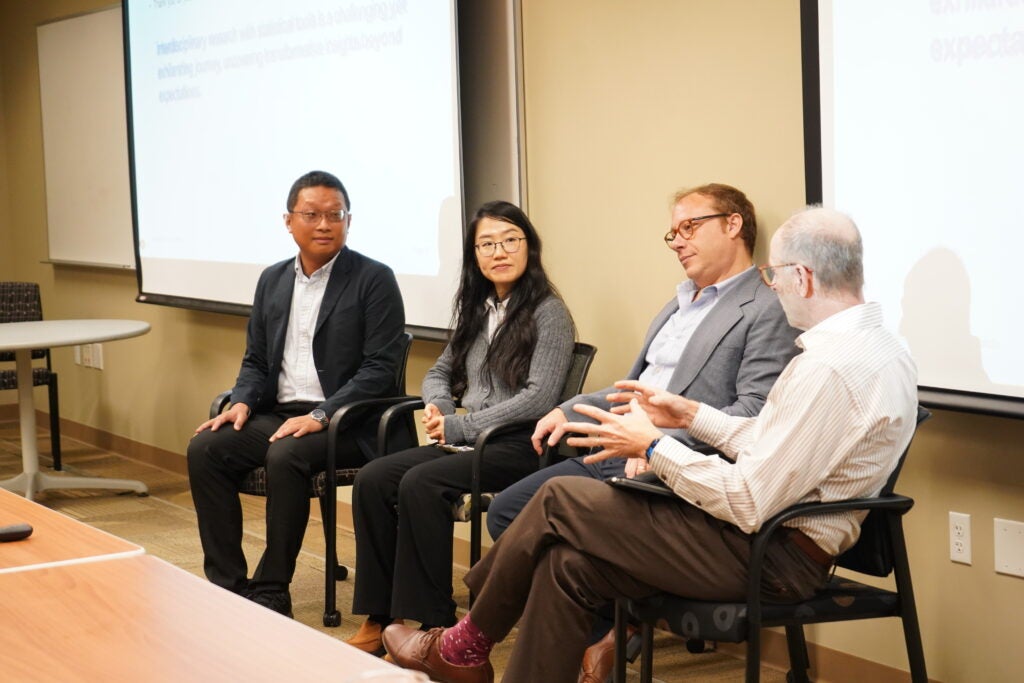College of Sciences Hosts Interdisciplinary Seminar on the Use of Statistical Tools and Research Techniques
Faculty come together to learn more about the research taking place in their college
By: Emily Dougherty | February 18, 2025

On January 27th, the College of Sciences hosted an interdisciplinary seminar entitled, “Statistical Tools and Techniques in Research,” bringing faculty together to share approaches to conducting research from across the College.
Hosted by Pegasus Professor & Associate Dean of Research Joshua Colwell, the event featured insightful talks from three faculty members, refreshments for guests, and an engaging Q&A for attendees at the end.
Colwell shared this in-person event is part of a new series of seminars for College of Sciences faculty and special guests to learn more about what is happening in various science disciplines and consider opportunities to work together.
“This series is meant to identify potential collaborations with colleagues to help the university foster new ideas for innovative research,” Colwell says.
Jacopo Baggio, Associate Professor in the School of Politics, Security, and International Affairs, was first to speak at the event, with his talk entitled, “Integrating multiple methods to understand social-ecological systems“.
Baggio explained how to solve horizontally structured problems in vertically structured institutions through the integration of multiple disciplines, theories, and methods.
“I try to see what the problem is, the theories that might help explain that problem, and the methodological approaches that are most appropriate to solve that problem based on the data and questions I have,” Baggio says.
His research consists of looking into methods to better understand social-ecological methods through two parts of a complex system.
“We must look at how we perceive the world and how we communicate,” Baggio says. “We look at cognitive abilities; but how do these translate to allow groups to make sense of the world and to make decisions?”
Baggio shared when looking back at history, groups of people who learn to adapt with the world’s changing conditions have gone on to thrive, while groups that haven’t progressed may no longer exist.
“Researchers need to understand the system and be able to systematize and understand how different parts of the world work,” he says.
After Baggio concluded his talk, Assistant Professor in the Department of Psychology, Shiyang Su, delivered her talk entitled, “Advancing Industrial and Organizational Psychology Research: Integrating Novel Methodological Approaches”.
Su shared that her research consists of workplace aggressions and deviant behaviors, adaptability, well-being, and health behaviors.
She says people relying on resumes to secure a job could become a thing of the past as more companies are showing interest in using LinkedIn profiles as an alternative.
“My research focusses on predicting personality from people’s LinkedIn profiles using natural processing,” Su says.
Through previous research, she says that personalities have a correlation to the outcome of one’s work, which can help find the right fit for an open role.
“In this study, we collected data from participants by providing their LinkedIn profiles,” Su says. “We use machine learning tools to process their textual data, especially their biography.”
Through the data collected from a candidate’s profile, Su says all the Big Five personality dimensions can be validly and reliably predicted.
The last of the speakers was Associate Professor in the Department of Statistics and Data Science Hsin-Hsiung Huang, who delivered his talk entitled, “From Threat Detection to Traffic Flows and Neuroimaging: Innovating Statistical Methods for Real-World Data Challenges”.
Huang shared that for three years, he and his students came in first place for the Algorithms for Threat Detection (ATD) Challenge, given by the National Geospatial-Intelligence Agency (NGA).
According to the National Science Foundation, this challenge consists of “developing the next generation of mathematical and statistical algorithms for analysis of large spatiotemporal datasets with application to quantitative models of human dynamics.”
Huang explained how this challenge isn’t easy for everyone involved.
“Our first time in the competition was in 2021 and we won,” Huang says. “We started the challenge with an unknown location and redacted data, which causes other researchers to drop out, but not us; (Huang and his students) we scored above 90%.”
Following the three panelists’ talks, the floor was opened to faculty who attended to take part in an engaging Q&A discussion led by Colwell.
The next Interdisciplinary Seminar held by the College of Sciences will be on February 24th. Faculty who would like more information on how to attend can reach out to Joshua Colwell.
